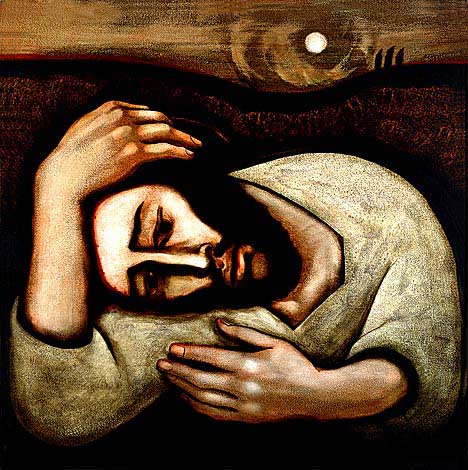
by Dana Kramer-Rolls
Now is a time, another time, where our Christian faith is tested.
Nazis in the streets of the United States? They have been with us for a while, often ignored, but this is not an essay about that. This is about putting on the mind of Jesus Christ; about following him.
My parish, as so many in the Episcopal Church, is ready, willing, and able to stand in witness against the rise of white supremacy. Presiding Bishop Curry has issued the call to hear and respond to the Gospel. And I honor these words and prayers, but I am concerned with this question: are we ignoring the silence and discernment which Jesus himself sought in times of difficulty and fear?
And Jesus went up to the mountain to pray.
Again and again he went and he prayed. Jesus went to the desert to discern. Jesus went to the garden for one last conversation with His Father (“Abba, are you sure, sure, sure?). Jesus as man prayed just as we do. But that kind of prayer isn’t communal, or liturgical. Jesus went to wrestle to understand the message his Father whispered to him.
My theological training doesn’t accept that the fully human Jesus was born aware of who he was. It unfolded. It came to him in moment by moment compassion, challenging the laws which he, as a good Jew, learned and respected. It came to him in a time and place, like our own, which was dangerous, with political and religious ideologies at war. Jesus went to the desert, and although it is told that after forty days Satan came to him. I don’t think that is the way it went. I think every cold hungry morning, every hot exhausting day, he looked at the rocks and asked himself if what he was hearing, that absurd, blasphemous thing that he heard, was true, why not feed himself.? Test it and prove it one way or the other. It was a test of discernment. And it went on every time he went up a mountain to pray, alone, not with his friends, not with the adulation of the crowd. Alone. In silence. Silence, except for the voice of God. And it didn’t stop. In the Garden waiting for the soldiers. On the Cross, crying out in the words of the psalmist. Not just an empty quote to satisfy millennia of theologians and preachers. A cry of desperation, a cry to find the discernment within.
We are again called to follow Christ Jesus. Yes, protesting Nazis, the KKK, white supremacist groups, seems like an easy thing. But we are not only called to hear the mob on “our” side, to be emotionally swamped by CNN hour-by-hour breaking news. We are called to follow Christ in prayer and in discernment. And how we are called to respond should not only be found in our Church leaders. It must be a response of the heart and the voice of the Spirit within.
The issue is not easy. March? Stand in witness? Preach or write?
All well and good, but how about the confession which we say weekly and some of us say twice a day. Have we loved God enough? Have we listened enough? Do we really fear the “other” and why? Have we questioned with an open heart just why we may still be unsure around people of color, or other religions or culture? And what about those who had family that found themselves on the wrong side of the Civil War and whose memory they would like to preserve?
We are prepared in Baptism. We are nourished at the Holy Table. We are awaked by preaching. We are influenced by the consensus of our communities. But also we are wrestling with questions which are not easy, and ones which we must face in silence, honestly, without false shame, but with an open heart before God. When we truly hear the voice of God in the silence of our hearts, only then can we find what we are called to do to bring the Kingdom into reality. That is the nuts and bolts of putting on the mind of Christ.
Dr. Dana Kramer-Rolls is a parishioner at All Souls Parish, Episcopal, Berkeley, California and earned her master’s degree and PhD from the Graduate Theological Union, Berkeley, California.
Image: Gethesemane by Michael O’Brien – used by permission

